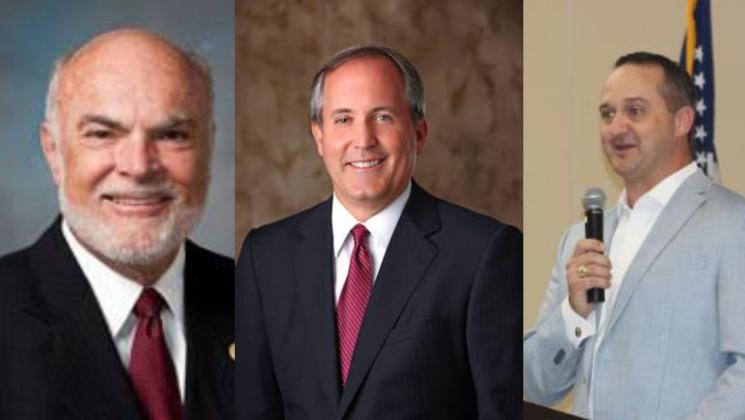Paxton places Colony Ridge blame on Bailes, Nichols
AUSTIN – Texas Attorney General Ken Paxton is no stranger to headlines and controversy, and that now includes his entanglement in the Colony Ridge drama playing out during the 88th Legislature’s third special session.
On Oct. 19, just before members of the Texas House Committee on State Affairs sat down, along with state Rep. Ernest Bailes, to discuss the controversial development on Liberty County’s north end, Paxton responded to Sept. 30 from the Texas congressional delegation, citing an analysis critical of the unincorporated community following an investigation by his office.
Detractors say the unchecked expansion of Colony Ridge has contributed to more crime and illegal immigration and is straining the resources of local schools. The developer has denied all of the allegations, telling reporters he has met state legal guidelines and saying reports of a cartel presence are overblown.
Some state officials want to put the development under a government conservatorship, a measure that could be considered during the special session but is opposed by the Liberty County Commissioners Court.
Paxton put the blame for what he considers a deteriorating situation squarely at the feet of Bailes and state Sen. Robert Nichols. Both are Republicans representing Liberty County.
“I am beyond disappointed in Sen. Nichols and Rep. Bailes for apparently working to enrich specific developers at enormous expense to the rest of the public and reducing the quality of life for their own constituents,” Paxton’s letter reads.
It is worth noting that both legislators supported the impeachment of Paxton earlier this year. Bailes voted to send it before the state Senate and Nichols was one of only two GOP senators to vote for impeachment. Paxton was acquitted on 16 charges, many of them stemming from allegations of political favors done on behalf of an Austin real estate developer under federal investigation.
Paxton argued that both lawmakers helped authorize the creation of a municipal management district in Colony Ridge, which he termed a misuse of power that virtually confers the status of a city to the development.
In a statement, Bailes fired back: “While I have maintained an active seat at the table with local leaders in order to help solve the complex issues that come with a rapidly growing community, the Colony Ridge development began in 2011, five years before I was first elected.”
As of press time, neither Nichols nor Congressman Brian Babin responded to The Vindicator for an interview request.
Bailes also argued the district came at the urging of Liberty County and Plum Grove, even pointing to resolutions from both governing bodies.
At the time of its formation in 2017, the MMD was just over 5 acres in size, and today has swelled to thousands of acres, a far contrast from a traditional MMD.
MMDs were created by the Legislature in 1991 and, according to state code, are intended “to promote, develop, encourage and maintain employment, commerce, economic development, and the public welfare in the commercial areas of municipalities and metropolitan areas of this state.”
“Colony Ridge is neither a commercial area of a municipality nor a metropolitan area of the state,” Paxton said.
Language in the 1990s legislation also notes an MMD “is necessary to promote, develop, encourage, and maintain employment, commerce, transportation, housing, tourism, recreation, the arts, entertainment, economic development, safety and the public welfare in the district.”
House Bill 4341 further states an MMD provides money for road and drainage maintenance, and supplemental police services — including funds for an additional full-time officer.
“This bill was to provide restrictions and ensure that any development in this area was as positive as it could possibly be,” Bailes said.
The lawmaker said the original MMD, or Liberty County Municipal Management District No. 1, comprised 500 acres. Still, according to Paxton and the original legislation, the district was just over 5 acres in size at its creation.
“The development appears to be attracting and enabling illegal alien settlement in the state of Texas and distressing neighboring cities and school districts,” Paxton told the Texas members of Congress. “Complaints from nearby communities about the development’s scale of growth and unmanageable externalities reveal that this unincorporated settlement has drawn far too many people and enabled far too much chaos for the current arrangement to be tolerated by the state.”
According to Paxton, Colony Ridge is one of several real-estate developments that has followed a model of selling bare lots in a practice often paired with offering minimal down-payment, high-interest owner-financed loans. He said the loans require very little proof of identity and believes it has created an “attractive opportunity for noncitizens.”
According to Paxton, the fallout has made it difficult for neighboring communities to shoulder the rapid growth, with the development quickly reaching the size of a city.
Paxton also raised concerns about a Legislature-appointed board to govern the MMD, with four of the five members working for Colony Ridge, including developer Trey Harris.
Bailes responded by pointing out two of the five seats were appointed by the county and two others by the Cleveland Independent School District, while Harris was given the final spot. Bailes believes that gives a clear majority to the voters of Liberty County.
Paxton commended Gov. Greg Abbott’s office for putting the Colony Ridge issue on the legislative agenda, and said his office was working with the administration to find answers.
“Sen. Nichols and Rep. Bailes created these problems with their initial legislation, and now the Legislature must undo what they have tolerated in their districts for years,” Paxton said.

